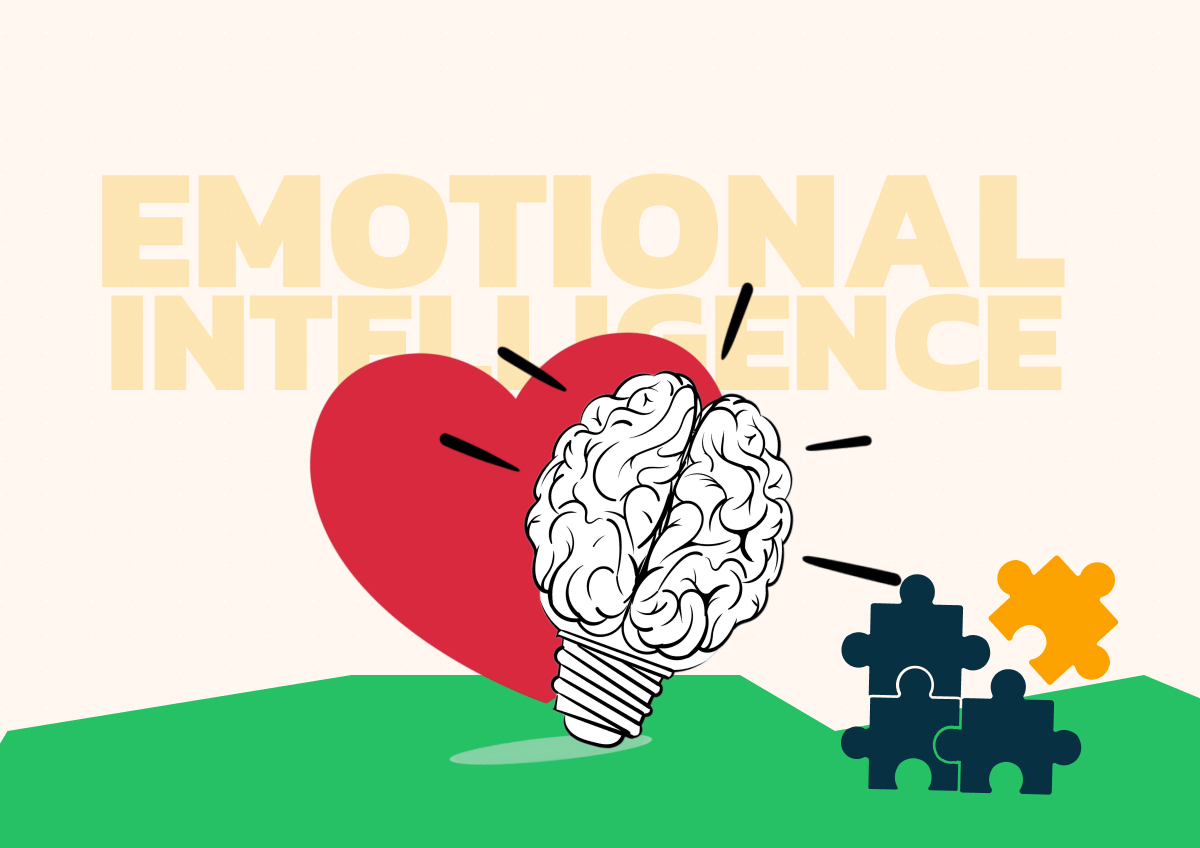Emotional intelligence (EQ) is the ability to recognize and understand emotions in oneself and others and to use this awareness to guide thought and behavior. In today’s fast-paced and increasingly complex world, emotional intelligence has become a vital skill for effective communication, collaboration, and decision-making. For instance, a study by TalentSmart found that emotional intelligence is responsible for 58% of a person’s overall performance in the workplace.
Furthermore, 90% of top performers in the workplace possess high emotional intelligence. So, what is emotional intelligence, and how can you develop it? In this article, we will explore the importance of emotional intelligence, its characteristics, and practical tips on how to develop it.

What is Emotional Intelligence?
Emotional intelligence is the capacity to recognize and manage your emotions, as well as empathize with others, to achieve better relationships, decision-making, and overall well-being. It is not just an innate trait but can be developed and improved through practice, training, and experience.
As you navigate your personal and professional life, you’ve probably encountered situations where you wished you had a better understanding of yourself and others. Emotional intelligence is the key to unlocking that understanding. For instance, when a friend is going through a tough breakup, you try to be supportive and understanding, but you’re not sure how to approach the situation.
Emotional intelligence is a complex trait that encompasses various skills, including self-awareness, self-regulation, motivation, empathy, and social skills. It’s the capacity to recognize and understand emotions in yourself and others, and to use this awareness to guide your thoughts and actions. This means that when you’re faced with a difficult situation like your friend’s breakup, you can use your emotional intelligence to respond in a way that’s supportive and constructive.
As you develop your emotional intelligence, you’ll become more aware of your own emotions and how they impact your behavior. You’ll be better equipped to manage stress, conflict, and change, and you’ll be more resilient, adaptable, and open to feedback. For example, when a colleague is being difficult, you’ll be able to stay calm and focused, rather than getting defensive or emotional. This, in turn, will help you build stronger relationships and achieve greater success in your personal and professional life.
The concept of emotional intelligence has been around for several decades, but it wasn’t until the 1990s that it gained popularity through the work of Peter Salovey and John D. Mayer. Since then, emotional intelligence has become a widely accepted concept in various fields, including psychology, education, and business, and it’s now recognized as a vital skill for personal and professional success.
Why is Emotional Intelligence Important?
You’ve probably experienced situations where you wished you had a better understanding of yourself and others. Emotional intelligence is the key to unlocking that understanding. For instance, when a friend is going through a tough disappointment, you try to be supportive and understanding, but you’re not sure how to approach the situation. Similarly, in the workplace, you may struggle to communicate effectively with your team members or manage stress and conflict.
Having high emotional intelligence brings numerous benefits. The importance of emotional intelligence is better decision-making, improved relationships, and enhanced overall well-being. When you’re able to recognize and understand emotions in yourself and others, you can respond appropriately, leading to more effective communication and conflict resolution. This, in turn, can lead to stronger relationships, both personal and professional. For example, as a manager or a leader of a team with high emotional intelligence can effectively address conflicts and motivate your workers or team members, leading to improved productivity and job satisfaction.
As you develop your emotional intelligence, you’ll become more aware of your own emotions and how they impact your behavior. This increased self-awareness will help you navigate personal and professional challenges more effectively. You’ll be better equipped to manage stress, build stronger relationships, and achieve greater success in your personal and professional life. Moreover, emotional intelligence plays an important role in effective communication, allowing you to empathize with others, respond appropriately, and build trust and rapport. By developing your emotional intelligence, you’ll become a more effective communicator, leading to stronger relationships and greater success in all areas of your life.
How to Improve Emotional Intelligence

You’ve recognized the importance of emotional intelligence and want to develop yours. Improving emotional intelligence takes practice, but with dedication and persistence, you can enhance your skills. For instance, you may have noticed that you often struggle to manage your emotions during conflicts or difficult conversations.
To improve your emotional intelligence, start by developing self-awareness and reflection. Take time to understand your values, beliefs, and emotions. Recognize how your emotions impact your behavior and decision-making. Ask yourself questions like “What triggers my emotions?” or “How do I respond to stress?” Reflecting on your emotions and behaviors will help you identify areas for improvement. As you become more self-aware, you’ll be better equipped to communicate effectively and empathize with others.
Effective communication and active listening are essential skills for emotional intelligence. Practice active listening by focusing on the speaker, asking clarifying questions, and paraphrasing what you’ve heard. This will help you understand others’ perspectives and respond appropriately. Additionally, work on expressing yourself clearly and assertively, without being aggressive or passive. When you communicate effectively, you’ll build stronger relationships and resolve conflicts more efficiently. Furthermore, developing emotional regulation skills will help you manage your emotions, even in challenging situations. This, combined with empathy, will allow you to understand and respond to others’ emotions, leading to deeper connections and more effective relationships.
What are the 5 Characteristics of Emotional Intelligence?
Emotional intelligence is the key to understanding yourself and others, and it’s essential for building strong relationships, achieving personal growth, and succeeding in your career. But what makes up emotional intelligence? What are the 5 characteristics that set emotionally intelligent people apart? The characteristics of emotional intelligence are Self-Awareness, Self-Regulation, Motivation, Empathy, and Social Skills. By developing these five traits, you’ll become more adept at managing your emotions, communicating effectively, and building strong relationships.
Self-Awareness
You’re able to recognize and understand your emotions, values, and beliefs. You’re aware of your strengths and weaknesses, and you’re honest with yourself about your motivations and desires. When you’re self-aware, you can identify your emotional triggers and manage them effectively. For example, if you know that you get defensive when criticized, you can take a step back and respond more thoughtfully.
Self-Regulation
You’re able to control your emotions and impulses, even in challenging situations. You can manage stress, anxiety, and frustration, and you’re able to adapt to change and uncertainty. Self-regulation helps you stay focused and composed under pressure. For instance, if you’re working on a tight deadline, you can stay calm and focused, even when things get chaotic.
Motivation
You’re driven to achieve your goals and pursue your passions. You’re resilient in the face of obstacles, and you’re willing to take calculated risks to succeed. When you’re motivated, you’re more productive, creative, and engaged. For example, if you’re working on a project you love, you’ll be more enthusiastic and dedicated to seeing it through.
Empathy
You’re able to understand and appreciate the perspectives and emotions of others. You can put yourself in their shoes and imagine how they feel, and you’re compassionate and supportive when they need it. Empathy helps you build stronger relationships and communicate more effectively. For instance, if a friend is going through a tough breakup, you can offer a listening ear and supportive words.
Social Skills
You’re able to effectively communicate and interact with others, build strong relationships, and manage conflict and difficult situations. You’re a team player, and you’re able to collaborate with others to achieve common goals. Social skills help you navigate complex social situations with ease. For example, if you’re working on a team project, you can communicate your ideas clearly and respectfully, and work together to achieve a common goal.
What are the benefits of emotional intelligence in the workplace?
As you navigate the challenges of your job, you’re likely to encounter situations that require more than just technical skills to resolve. Emotional intelligence plays a crucial role in achieving success in the workplace, and its benefits are undeniable. The benefits of emotional intelligence in the workplace are cultivating emotional intelligence, you’ll become a more effective communicator, a better team player, and a more resilient leader, leading to improved collaboration, increased productivity, and enhanced job satisfaction.
When you possess high emotional intelligence, you’re able to understand and manage your own emotions, as well as empathize with your colleagues. This leads to more effective communication, reduced conflict, and stronger relationships with your team members. You’ll be better equipped to handle stress and pressure, making you a more resilient and adaptable employee. Moreover, emotional intelligence helps you understand the emotional currents in your workplace, allowing you to navigate office politics with ease and build a stronger reputation as a leader. By developing your emotional intelligence, you’ll become an invaluable asset to your organization, leading to new opportunities and career growth.
How can I develop emotional intelligence in the workplace?
As you recognize the importance of emotional intelligence in your job, you may wonder how to develop this essential skill. The good news is that emotional intelligence can be learned and improved with practice, and the workplace is a great place to start. You can develop emotional intelligence in the workplace by practicing self-awareness, seeking feedback, and engaging in empathetic interactions with your colleagues, you can enhance your emotional intelligence and become a more effective and valued employee.
Start by tuning into your own emotions and recognizing how they impact your behavior. Take a step back and reflect on your strengths and weaknesses and be open to constructive criticism from others. Ask for feedback from trusted colleagues or mentors and use it as an opportunity to learn and grow. Additionally, try to understand and appreciate the perspectives of your coworkers, and engage in active listening to build stronger relationships. With time and practice, you’ll become more attuned to the emotional dynamics in your workplace, and your emotional intelligence will flourish.
What is the average cost of emotional intelligence training In Nigeria?
As you consider enrolling in emotional intelligence training in Nigeria, you’re probably curious about the cost. You want to invest in a program that fits your budget and provides valuable skills for your personal and professional growth. What is the average cost of emotional intelligence training In Nigeria? The cost varies depending on the provider, with prices ranging from £50 per module per student to £5,500 for a half-day workshop, according to RocheMartin’s training programs.
The Knowledge Academy offers a one-day emotional intelligence course with an exam, and while the cost isn’t specified, they claim to provide training at a low cost. Piston and Fusion also offer training for emotional intelligence at the rate of N130,000. It’s essential to research different providers and compare prices to find the best fit for your needs. Keep in mind that investing in emotional intelligence training can lead to improved relationships, better communication skills, and enhanced career prospects, making it a valuable investment in your future. By understanding the cost and benefits of emotional intelligence training, you can make an informed decision that aligns with your personal and professional goals.
Conclusion
In conclusion, understanding what emotional intelligence is and how to develop it is crucial for personal and professional growth. By recognizing the importance of emotional intelligence and actively working to improve it, you’ll become a more effective communicator, a better team player, and a more resilient leader. With the knowledge of what emotional intelligence is and how to develop it, you’ll be empowered to achieve your goals and reach new heights. By prioritizing emotional intelligence development, you’ll unlock a brighter future filled with improved relationships, increased productivity, and enhanced overall well-being.






